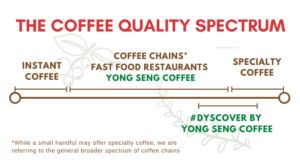Specialty Grade Coffee
The term “specialty grade” has become a common phrase in the coffee industry, but what exactly is it? In its most basic form, specialty coffee is an extremely high-quality coffee that has fewer than five defects per sample. The defects can be in the form of color, texture, or aroma. Some defects are more serious than others, such as sour flavor. However, in general, defects in a coffee do not affect its flavor or quality.
A specialty grade coffee is characterized by its full-bodied sweetness and lack of green defects. Its full-bodied taste is one of the characteristics that makes it desirable to many specialty coffee drinkers. However, it is often misunderstood that a clean cup of coffee means it is free of grounds, but the term actually refers to a coffee’s consistency from start to finish. Any coffee that fails to pass this test is considered low-quality and will have a sour taste.

The SCA has developed its own criteria for what constitutes a specialty grade. It is determined by a panel of experts who use a variety of methods to evaluate coffee samples. They score them based on their overall quality, defects, taste, and moisture content. There are different types of specialty coffee, and each grade has its own unique characteristics. To obtain a specialty grade, a coffee must receive at least an 80-point score. However, many people argue that roasting is not a specialty.
What Is Specialty Grade Coffee?
While organic coffee is a great choice for consumers, there are many reasons to consider purchasing specialty-grade coffee. One of the most important reasons for doing so is to support coffee farmers, which are the backbone of this industry. Besides ensuring that coffee is grown sustainably, specialty grade coffee also ensures the safety of its drinkers. While coffee has several stages of production, the final product should meet at least 80 points to be classified as specialty grade.
The SCA defines two types of coffee: premium and specialty. Premium-grade coffee is grown on farms where conditions are ideal and ripeness is maximized. Specialty grade coffee beans must also be free of defects, including “quakers,” which are unripe. The moisture content of specialty grade coffee must be nine to thirteen percent, which helps prevent the development of mold, mycotoxin, and fermentation. It cannot contain any beans that are sour.
The difference between commercial-grade and specialty grade coffee is significant. While commercial coffees are cheaper, specialty-grade beans are more expensive and hold a higher quality standard. A defected coffee bean is considered “fake” and not “specialty grade.”
The final grading process is an intense one. Green coffee is graded as it grows, then it undergoes cupping. The cupping process evaluates a sample bean. Certified graders look for defects, such as color and odor. These traits are what determine which coffee is specialty-grade. Coffee with a score of eighty or higher qualifies as specialty-grade. Then, it goes through several quality checks to become a specialty-grade coffee.